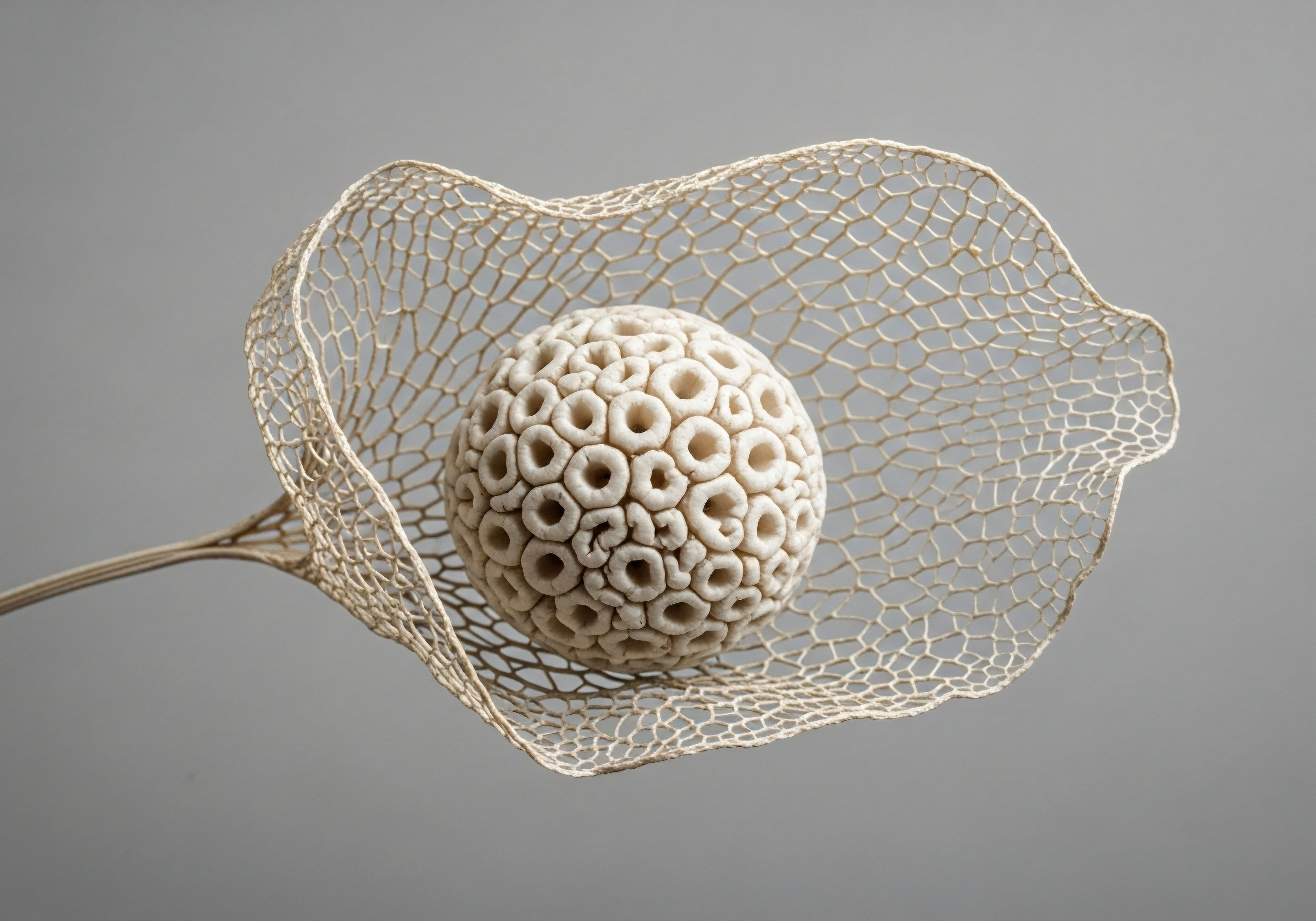

Fundamentals
You may have noticed a subtle shift in the way your mind works. The name that was once on the tip of your tongue now feels miles away. The mental sharpness required to solve a complex problem at work feels blunted, replaced by a persistent, low-grade fog.
This experience, a quiet erosion of cognitive vitality, is a deeply personal and often frustrating reality for many men. It is a feeling of functioning at a lower capacity, a sense that the internal engine is running with less power and precision. This is not a failure of willpower or a simple consequence of a busy life. It is often the direct, tangible result of changes within your body’s most fundamental communication network ∞ the endocrine system.
Your brain’s ability to think, remember, and maintain focus is profoundly linked to the symphony of hormones that circulate throughout your body. These chemical messengers, particularly testosterone and its related compounds, are the architects and maintainers of your neurological infrastructure. They are foundational to the very structure and function of your brain cells.
When these hormonal signals become weak, inconsistent, or imbalanced, the cognitive consequences are direct and perceptible. The feeling of mental fatigue is a physiological signal, a check-engine light indicating that the systems supporting cognitive performance require attention. Understanding this connection is the first step toward reclaiming your mental edge, moving from a state of concern to one of empowered, proactive management of your own biological systems.

The Brain’s Endocrine Foundation
The human brain is an exceptionally energy-demanding organ, and its performance is contingent upon a stable internal environment. Hormones provide the critical regulatory framework for this environment. For men, androgens like testosterone are primary regulators of cerebral health.
Testosterone receptors are densely populated in key brain regions associated with higher-order cognitive functions, including the hippocampus, which is central to memory formation, and the prefrontal cortex, the seat of executive functions like planning, decision-making, and impulse control. The presence of these receptors signifies a direct and continuous dialogue between your hormonal status and your cognitive capacity.
Optimal testosterone levels facilitate efficient neuronal communication, support the growth and survival of brain cells, and help maintain the delicate balance of neurotransmitters that govern mood and motivation.
This system operates under the direction of a sophisticated control mechanism known as the Hypothalamic-Pituitary-Gonadal (HPG) axis. Think of this as the central command for male hormonal health. The hypothalamus, a small region at the base of the brain, releases Gonadotropin-Releasing Hormone (GnRH).
This signals the pituitary gland to release Luteinizing Hormone (LH) and Follicle-Stimulating Hormone (FSH). LH then travels through the bloodstream to the testes, instructing them to produce testosterone. This entire system is a feedback loop; when testosterone levels are sufficient, they signal back to the hypothalamus and pituitary to slow down production, maintaining a state of equilibrium or homeostasis.
The age-related decline in testosterone production, often termed andropause, represents a gradual dysregulation of this axis, leading to a less robust hormonal signal and, consequently, a decline in the support systems for cognitive function.
Optimized hormonal health provides the essential biological resources for the brain to maintain its structural integrity and functional efficiency.

Key Hormones and Their Cognitive Roles
While testosterone is the most recognized male hormone, a comprehensive understanding of cognitive health requires acknowledging its relationship with other key endocrine players. The body is an interconnected system, and hormones function as a coordinated orchestra. The cognitive benefits of hormonal optimization arise from restoring balance across this entire system.
- Testosterone ∞ This is the primary androgen responsible for maintaining neuronal health. It has been shown to have neuroprotective properties, shielding brain cells from various forms of injury and stress. It directly influences synaptic plasticity, the biological process that underlies learning and memory, and supports the production of key neurotransmitters like dopamine, which is essential for motivation, focus, and reward-driven behavior. A decline in testosterone can lead to a direct reduction in dopaminergic activity, manifesting as apathy, low drive, and difficulty concentrating.
- Estradiol (an Estrogen) ∞ In the male body, a portion of testosterone is converted into estradiol by an enzyme called aromatase. This conversion is not a flaw; it is a critical biological process. Estradiol plays a vital role in male cognitive function, contributing to memory, spatial reasoning, and even libido. It has powerful neuroprotective effects and works synergistically with testosterone to support brain health. The goal of hormonal optimization is not to eliminate estrogen but to maintain an optimal ratio between testosterone and estradiol. An imbalance in either direction can negatively impact cognitive function and mood.
- DHEA (Dehydroepiandrosterone) ∞ Produced primarily by the adrenal glands, DHEA is a precursor hormone that can be converted into both testosterone and estrogen. DHEA levels also decline with age, and this decline is associated with cognitive impairment. It functions as a neurosteroid, directly affecting excitability and plasticity in the brain. Supporting healthy DHEA levels is another component of a comprehensive approach to cognitive wellness, as it provides the raw materials for other essential hormones and has its own independent benefits on brain function.

What Happens When Hormonal Signals Decline?
A decline in androgenic signaling initiates a cascade of downstream effects within the brain. The subjective experience of “brain fog” has a clear biological basis. Reduced testosterone levels are associated with decreased cerebral blood flow, meaning less oxygen and fewer nutrients are delivered to energy-hungry brain tissue.
This can impair the brain’s ability to perform complex tasks and sustain focus over long periods. Furthermore, the structural integrity of the brain can be affected. Studies have linked higher testosterone levels in midlife to better preservation of brain tissue in certain areas as men age.
Conversely, low testosterone is associated with an increase in the deposition of beta-amyloid plaque, the protein aggregate strongly implicated in Alzheimer’s disease. This suggests that maintaining optimal hormonal levels is a long-term strategy for preserving brain structure and reducing the risk of neurodegenerative conditions. The cognitive slowdown is a direct reflection of a brain operating in a suboptimal biochemical environment, one that is less resilient, less plastic, and less efficient.


Intermediate
Understanding that hormonal balance is foundational to cognitive function naturally leads to a practical question ∞ how is this balance clinically restored and maintained? The process of hormonal optimization moves beyond simply replacing a single hormone. It involves a sophisticated, systems-based approach designed to recalibrate the entire Hypothalamic-Pituitary-Gonadal (HPG) axis.
The protocols are designed to mimic the body’s natural rhythms and maintain the delicate interplay between testosterone, estrogen, and other supportive hormones. This clinical strategy is built on the principle of providing the body with the resources it needs to restore its own optimal function, directly impacting the neurological pathways that govern cognitive clarity, memory, and executive function.
The core of this approach for men is Testosterone Replacement Therapy (TRT), but the modern clinical application of TRT is far more nuanced than a simple injection of testosterone. It is a multi-faceted protocol that anticipates and manages downstream hormonal conversions and feedback loops.
The objective is to achieve stable, physiological levels of androgens, prevent potential side effects, and support the body’s own endogenous production where possible. This precision is what translates into sustained long-term cognitive benefits. By stabilizing the brain’s hormonal environment, we provide the groundwork for enhanced neurotransmitter function, improved synaptic health, and lasting neuroprotection.

Core Clinical Protocols for Cognitive Optimization
A standard, effective protocol for male hormone optimization is designed to address multiple parts of the HPG axis simultaneously. This ensures that the therapeutic effects are both comprehensive and sustainable. The typical protocol involves a combination of injectable testosterone, a medication to manage estrogen conversion, and another to support natural testicular function.

How Do Clinical Protocols Support Brain Health?
The cognitive improvements reported by men on optimized hormonal protocols are a direct result of these therapies’ impact on brain physiology. Restoring testosterone to a healthy, youthful range has profound effects on the central nervous system. It enhances the efficiency of neurotransmitter systems, particularly dopamine, which is crucial for motivation, focus, and feelings of reward.
This can manifest as a renewed drive to engage in complex tasks and a greater capacity for sustained concentration. Furthermore, testosterone has been shown to improve verbal memory, spatial reasoning, and executive function. These benefits are not just subjective feelings; they are measurable improvements in cognitive performance rooted in the restoration of the brain’s ideal biochemical state.
The table below outlines the standard components of a comprehensive TRT protocol and their specific roles in achieving both hormonal balance and cognitive enhancement.
| Component | Typical Medication | Mechanism of Action | Contribution to Cognitive Health |
|---|---|---|---|
| Testosterone Base | Testosterone Cypionate (Intramuscular or Subcutaneous) | Provides a bioidentical source of testosterone to restore circulating levels to an optimal physiological range. | Directly activates androgen receptors in the hippocampus and prefrontal cortex, supporting memory, executive function, and mood. Enhances dopamine release, improving focus and motivation. |
| Aromatase Inhibition | Anastrozole (Oral) | Blocks the aromatase enzyme, which converts testosterone into estradiol (estrogen). This helps maintain an optimal testosterone-to-estrogen ratio. | Prevents cognitive and mood-related side effects of excess estrogen, such as emotional lability and brain fog, while preserving enough estradiol for its own neuroprotective benefits. |
| HPG Axis Support | Gonadorelin or Enclomiphene | Gonadorelin mimics natural GnRH, stimulating the pituitary to produce LH and FSH. Enclomiphene blocks estrogen receptors at the pituitary, increasing LH and FSH output. | Maintains testicular sensitivity and some endogenous testosterone production. This supports a more stable overall hormonal environment and can contribute to a better sense of well-being, which is tied to cognitive state. |

The Role of Peptides in Advanced Cognitive Enhancement
For individuals seeking to move beyond foundational hormonal health and further enhance cognitive and physical vitality, peptide therapies represent a powerful complementary strategy. Peptides are short chains of amino acids that act as precise signaling molecules in the body. Unlike hormones, which can have broad effects, peptides often have very specific targets, allowing for a highly tailored approach to wellness. In the context of cognitive health, certain peptides that stimulate the release of Growth Hormone (GH) are particularly relevant.
Comprehensive hormonal protocols are designed to restore systemic balance, which in turn provides the brain with the necessary tools for optimal performance.
The Growth Hormone/IGF-1 axis is deeply interconnected with brain function. GH stimulates the liver to produce Insulin-Like Growth Factor 1 (IGF-1), a hormone that can cross the blood-brain barrier and exert powerful neuroprotective and neurogenic effects. IGF-1 promotes the growth of new neurons, enhances synaptic plasticity, and plays a critical role in brain repair processes.
The primary benefit of using GH-releasing peptides is their ability to stimulate the body’s own production of growth hormone in a natural, pulsatile manner, mimicking youthful physiology without the risks associated with direct administration of synthetic HGH.

Key Peptides for Cognitive Support
- Sermorelin ∞ A peptide that mimics Growth Hormone-Releasing Hormone (GHRH), directly stimulating the pituitary gland to produce and release GH. Its primary benefit is the restoration of a more youthful pattern of GH secretion.
- Ipamorelin / CJC-1295 ∞ This is a popular combination therapy. CJC-1295 is a GHRH analogue with a longer duration of action, providing a steady stimulus to the pituitary. Ipamorelin is a GH secretagogue that also stimulates GH release through a separate pathway (the ghrelin receptor) and does so without significantly impacting cortisol or other hormones. Together, they create a potent, synergistic effect on GH levels.
- Tesamorelin ∞ Another powerful GHRH analogue, Tesamorelin has been specifically studied for its cognitive benefits in older adults. Research has shown it can improve executive function and verbal memory in individuals with mild cognitive impairment, making it a targeted choice for those with specific cognitive concerns.
The primary cognitive benefit derived from these peptide therapies comes from the deep, restorative sleep they promote. The majority of the body’s GH is released during slow-wave sleep. By enhancing this natural process, these peptides lead to significant improvements in sleep quality.
This is critical for cognitive function, as it is during deep sleep that the brain consolidates memories, clears out metabolic waste (via the glymphatic system), and repairs cellular damage. Waking up feeling genuinely rested is a hallmark of optimized GH levels and is directly tied to improved mental clarity and performance throughout the day.


Academic
A sophisticated examination of the long-term cognitive benefits of optimized male hormonal health requires moving beyond systemic effects and into the cellular and molecular arenas of the central nervous system. The enduring enhancements to memory, executive function, and processing speed are not merely epiphenomena of improved mood or vitality.
They are the macroscopic manifestation of testosterone’s profound role as a neuromodulatory and neuroprotective agent. The dominant pathway through which these benefits are conferred is the dual action of androgens in mitigating chronic, low-grade neuro-inflammation while simultaneously promoting the structural and functional resilience of neurons, a process known as synaptic plasticity. These two processes are deeply intertwined, and their co-optimization creates a cerebral environment conducive to high-level cognitive performance and long-term brain health.
Androgens, acting through both genomic and non-genomic pathways, exert a powerful regulatory influence on the brain’s innate immune cells, primarily the microglia. In a state of hormonal decline, microglia can become chronically activated, perpetuating a cycle of inflammatory cytokine release that is toxic to neurons and disruptive to synaptic function.
This state of persistent inflammation is a key pathological feature in age-related cognitive decline and neurodegenerative diseases. Testosterone and its metabolites directly suppress this pro-inflammatory signaling, shifting microglia from a reactive, damaging state to a homeostatic, supportive one. This reduction in the brain’s inflammatory tone is the critical first step in restoring its functional integrity.

Androgenic Regulation of Neuro-Inflammation and Microglial Activity
Microglia are the resident immune sentinels of the central nervous system. In a healthy brain, they perform essential housekeeping functions, clearing cellular debris and monitoring for pathogens. However, with aging and hormonal decline, they can adopt a pro-inflammatory phenotype, releasing substances like Tumor Necrosis Factor-alpha (TNF-α) and Interleukin-1 beta (IL-1β).
These cytokines can directly impair long-term potentiation (LTP), the cellular mechanism underlying memory formation, and can even trigger neuronal apoptosis (programmed cell death). Testosterone acts as a braking mechanism on this process. It has been demonstrated that androgens can suppress the activation of key inflammatory transcription factors, such as Nuclear Factor-kappa B (NF-κB), within microglial cells. This prevents the transcription of pro-inflammatory genes, effectively calming the brain’s immune response.
This anti-inflammatory action is a crucial component of testosterone’s neuroprotective effect. By reducing the background noise of chronic inflammation, testosterone allows for more efficient neuronal signaling. The cognitive experience of “brain fog” can be conceptualized as a state of high inflammatory load, where synaptic communication is disrupted by persistent cytokine signaling.
Restoring optimal androgen levels lifts this inflammatory burden, leading to improved signal-to-noise ratio in neural circuits and a corresponding improvement in cognitive clarity and processing speed. A pilot clinical trial in men with multiple sclerosis, an inflammatory and neurodegenerative disease, found that testosterone treatment was associated with a halt and even a reversal of gray matter atrophy, providing compelling clinical evidence for its anti-inflammatory and neuro-restorative potential.
Testosterone’s ability to modulate the brain’s immune system is a key mechanism behind its capacity to preserve long-term cognitive function.

How Does Testosterone Promote Synaptic Plasticity and Neurogenesis?
While controlling inflammation creates a permissive environment for cognitive function, the direct promotion of synaptic plasticity and neurogenesis by androgens is what actively enhances it. Testosterone, along with its powerful metabolite estradiol, is a potent modulator of Brain-Derived Neurotrophic Factor (BDNF). BDNF is arguably the most important molecule for neuroplasticity.
It is a protein that supports the survival of existing neurons, encourages the growth and differentiation of new neurons (neurogenesis), and strengthens synapses. Higher levels of BDNF are robustly associated with improved learning, memory, and overall cognitive function. Both testosterone and estradiol have been shown to increase the expression of the BDNF gene in key areas of the brain like the hippocampus and prefrontal cortex.
This process is mediated through the activation of complex intracellular signaling cascades. When testosterone or estradiol binds to its respective receptor on a neuron, it can trigger pathways like the PI3K/Akt and MAPK/ERK pathways. These signaling cascades are central to cell survival, growth, and plasticity.
For example, the PI3K/Akt pathway is a powerful anti-apoptotic pathway, directly inhibiting the cellular machinery that leads to programmed cell death. Simultaneously, the MAPK/ERK pathway plays a critical role in regulating the synthesis of proteins necessary for building and strengthening synapses during learning. By activating these pathways, androgens are not just protecting neurons from damage; they are actively promoting the growth and refinement of the neural circuits that form the basis of our cognitive abilities.
The following table summarizes key studies and findings that illustrate the mechanistic links between testosterone and cognitive health, providing a glimpse into the academic evidence supporting these concepts.
| Study Focus | Key Findings | Implication for Cognitive Health | Source Type |
|---|---|---|---|
| Testosterone and Gray Matter Volume in MS | Testosterone treatment in men with relapsing-remitting MS was associated with a significant reduction in gray matter atrophy compared to a non-treatment phase. | Demonstrates a powerful neuroprotective and potentially restorative effect of testosterone on brain structure in the context of a neuro-inflammatory disease. | Pilot Clinical Trial |
| Androgen Receptor Signaling | Testosterone acts on androgen receptors present throughout the CNS, activating signaling pathways like PI3K/Akt and ERK, which are crucial for neuronal survival and plasticity. | Provides a molecular mechanism for how testosterone directly supports the health and function of brain cells, protecting against degeneration. | Review of Molecular Biology |
| Testosterone and Alzheimer’s Disease Pathology | Lower testosterone levels are associated with higher levels of beta-amyloid deposition. Testosterone has been shown in vitro to reduce the production of beta-amyloid. | Suggests that maintaining optimal testosterone levels may be a long-term strategy to reduce the risk of developing key pathological features of Alzheimer’s disease. | Basic and Clinical Research |
| TRT and Cognitive Domains | Systematic reviews show mixed but promising results, with many smaller studies reporting improvements in specific cognitive domains like verbal memory, spatial ability, and executive function after TRT. | Highlights that while large-scale consensus is still developing, the clinical evidence points toward tangible cognitive benefits, particularly when protocols are well-managed. | Systematic Review |
In conclusion, the academic perspective reveals that the long-term cognitive benefits of optimized hormonal health are deeply rooted in the molecular biology of the brain. The process is an elegant synergy of effects. By suppressing chronic neuro-inflammation, testosterone creates a stable and healthy foundation.
Upon this foundation, through the upregulation of critical neurotrophic factors like BDNF and the activation of pro-survival signaling cascades, it actively promotes the structural and functional enhancements that lead to improved memory, sharper focus, and greater cognitive resilience. This is a model of proactive biological maintenance, where hormonal optimization serves as a primary tool for preserving the brain’s most vital functions over the lifespan.

References
- Cherrier, M. M. Asthana, S. Plymate, S. Baker, L. D. Matsumoto, A. M. Eckert, K. & Craft, S. (2001). Testosterone supplementation improves spatial and verbal memory in healthy older men. Neurology, 57(1), 80 ∞ 88.
- Kurth, F. Luders, E. Sicotte, N. L. Gaser, C. Giesser, B. S. Swerdloff, R. S. & Voskuhl, R. R. (2014). Neuroprotective effects of testosterone treatment in men with multiple sclerosis. Neuroimage ∞ Clinical, 4, 454 ∞ 460.
- Rosario, E. R. Carroll, J. C. & Pike, C. J. (2004). Testosterone regulation of Alzheimer-like neuropathology in male 3xTg-AD mice involves both estrogen and androgen pathways. Brain Research, 1004(1-2), 1-5.
- Moffat, S. D. Zonderman, A. B. Metter, E. J. Blackman, M. R. Harman, S. M. & Resnick, S. M. (2002). Longitudinal assessment of serum free testosterone concentration predicts memory performance and cognitive status in elderly men. The Journal of Clinical Endocrinology & Metabolism, 87(11), 5001-5007.
- Resnick, S. M. Matsumoto, A. M. Stephens-Shields, A. J. Ellenberg, S. S. Gill, T. M. Shumaker, S. A. & Snyder, P. J. (2017). Testosterone treatment and cognitive function in older men with low testosterone and age-associated memory impairment. JAMA, 317(7), 717-727.
- Bialek, M. Zaremba, P. Borowicz, K. K. & Czuczwar, S. J. (2004). Neuroprotective role of sex hormones. Pharmacological Reports, 56(5), 539-550.
- Goudsmit, E. Swaab, D. F. & Fliers, E. (1990). The biological clock and aging. In Hormones and the Brain (pp. 139-146). Karger Publishers.
- Janowsky, J. S. (2006). Thinking with your gonads ∞ testosterone and cognition. Trends in cognitive sciences, 10(2), 77-82.
- Grigorova, M. Sherwin, B. B. & Tulandi, T. (2006). Effects of testosterone replacement on cognitive function in young women with surgically induced menopause. Fertility and sterility, 85(5), 1339-1345.
- Beauchet, O. (2006). Testosterone and cognitive function ∞ current clinical evidence of a relationship. European journal of endocrinology, 155(6), 773-781.

Reflection

Calibrating Your Internal Systems
The information presented here offers a map of the intricate connections between your internal biochemistry and your cognitive world. It provides a framework for understanding that the feelings of mental fog, diminished focus, or memory lapses are not abstract complaints but tangible signals from a complex and finely tuned biological system.
The science of hormonal optimization gives us a language to describe these experiences and a set of tools to address them at their physiological root. This knowledge transforms the conversation from one of passive aging to one of proactive, personalized calibration.
Consider your own cognitive experience. Where do you feel the most friction in your mental processing? Is it in recalling information, sustaining focus through a demanding project, or maintaining the mental energy to stay present with your family after a long day? Viewing these challenges through an endocrine lens allows you to reframe them.
They become data points, guiding you toward a more precise inquiry into your own health. The path to sustained cognitive vitality is a personal one, built on a deep understanding of your unique biology. This journey begins with the recognition that your mind and body are a single, integrated system, and that nurturing the health of one is the most powerful way to enhance the function of the other.

Glossary

testosterone levels

hormonal health

cognitive function

hormonal optimization

cognitive benefits

synaptic plasticity

executive function

testosterone replacement therapy

neuroprotection

hpg axis

central nervous system

verbal memory

cognitive health

sermorelin

neuro-inflammation




